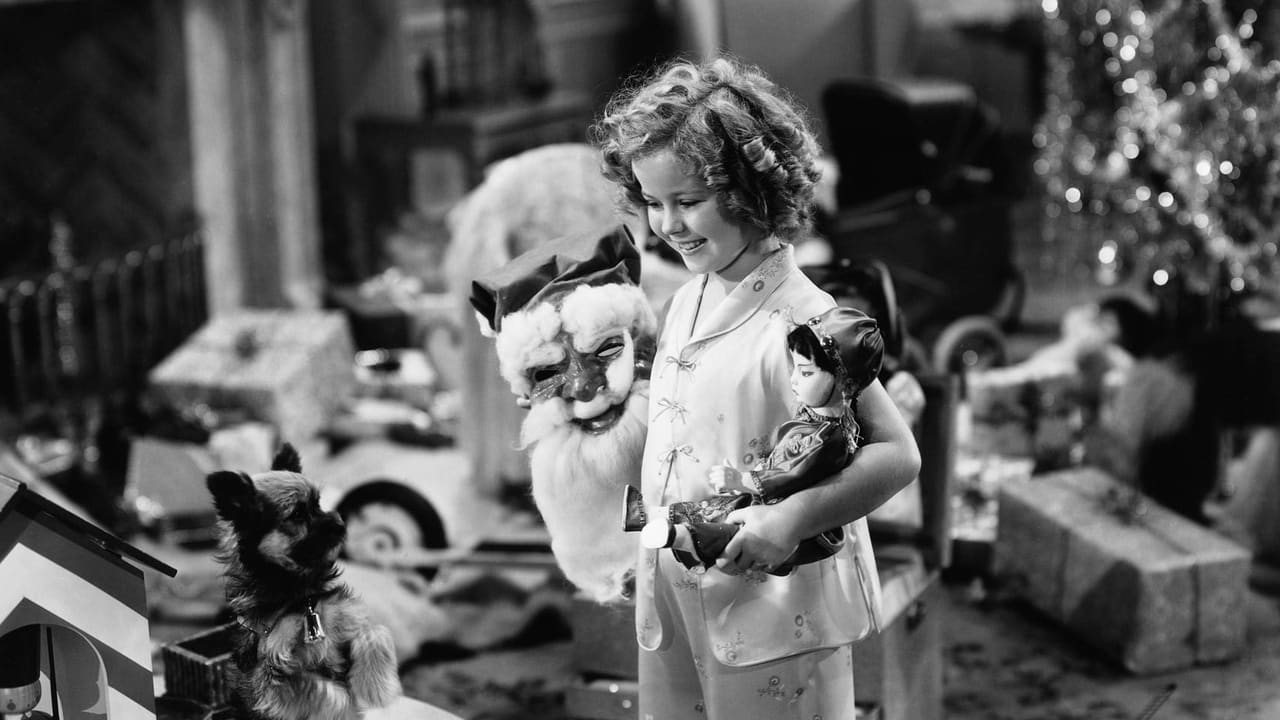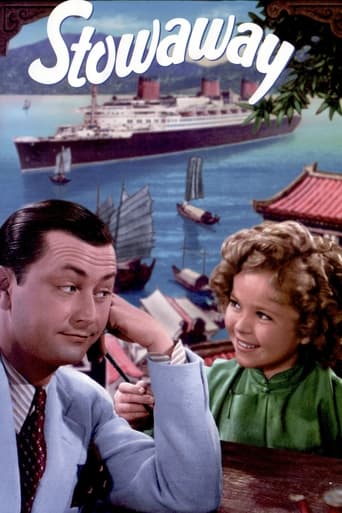


I like the storyline of this show,it attract me so much
... View MoreThe thing I enjoyed most about the film is the fact that it doesn't shy away from being a super-sized-cliche;
... View MoreThere's no way I can possibly love it entirely but I just think its ridiculously bad, but enjoyable at the same time.
... View MoreBy the time the dramatic fireworks start popping off, each one feels earned.
... View MoreThis is still Shirley Temple's film, but the romance between Alice Faye and Robert Young gets lots of time in this film...making it a bit more balanced and not quite as child-oriented as some of Shirley's films.Shirley is...well...Shirley, with her musical highlight being "Goodnight, My Love", with the song being reprised by Alice Faye.Faye is very good here, and Robert Young is excellent. You really do hope they get married! The supporting cast does their jobs -- Helen Westley is suitably unbearable as the potential mother-in-law. Eugene Palette doesn't get much screen time, but his barrel-voice is always welcome. Arthur Treacher also doesn't get much film time, and does better in other Temple films.This is one of the better Temple films, but far from the best. But the balance with a more adult story line makes it quite enjoyable.
... View MoreAs I watched this film, I was shocked how the amazingly talented Shirley Temple APPEARED to be speaking Chinese. I assumed she was actually speaking nonsense. I was thrilled, however, by Moondog-8's review as they said that she really WAS speaking reasonably good Mandarin Chinese!! What a talented kid!! Ching-Ching is the orphaned child of missionaries in China. She mostly wanders the street like a ray of sunshine. She happens upon a playboy bachelor (Robert Young) and he's naturally taken by her. Later, when she accidentally stows away on the same ship as Young, he befriends her and even wants to adopt her. But, he needs to find a wife FAST, as they won't let a bachelor adopt a kid. So, he asks a very nice lady (Alice Faye) and the rest is for you to see for yourself.This film is unusual in that it's pure sentimentality and schmaltz...yet it manages to work. This is because of the combined talents of Shirley, Robert Young and Alice Faye--who were all at the top of their game. Plus, the writing is good...provided you can dismiss some nagging questions you'll naturally face. So, try not to think HOW an orphan living in impoverished China can have permed curls, clean clothes and look well-fed! Just ignore all this and take in the fun--and the film does manage to be quite fun.By the way, in the credits, Faye's fiancé is credited as Allan Lane. Later, he gained fame as cowboy star 'Rocky' Lane.
... View More"Sparkle, Shirley, sparkle!" Gertrude Temple cried between takes whenever her little daughter's energy flailed. As Ching-Ching, an American girl living in China, Shirley sparkles, all right; she just never dazzles. Little Ching-Ching is full of happy grins and spouts plenty of wise Chinese proverbs, but not once does she break into one of the delightful song-and-dance routines that make Shirley's other films so memorable. She only dances very briefly in this movie, and it is a great disappointment to fans who want to see the tapping that made her such a world famous star.Another disappointment is the absence of memorable music. Shirley's song "You've Gotta Smile to be Happy" showcases her impressive talent for mimickry -- she channels Eddie Cantor and Ginger Rogers, among others -- but her other two songs, "Goodnight My Love" and "That's What I Want for Christmas," completely lack the snap and fun of catchy classics like "On the Good Ship Lollipop" (Bright Eyes), "Animal Crackers in My Soup" (Curly Top), "At the Codfish Ball" (Captain January), "Oh My Goodness" (Poor Little Rich Girl), or "The Old Kent Road" (The Little Princess).What sparkle Shirley does achieve is snuffed by the dreary adult performances. Ching-Ching's rural guardians, the Kruikshanks, and her pal Sun Lo are almost laughable. Alice Faye's character, Susan Parker, is clearly in love with Ching-Ching, but that's about the only emotion she seems to have. Susan has been harboring doubts about her engagement to the very contrived, cardboard character Richard Hope -- largely because of Richard's sickly enmeshment with his mother, played to meddlesome perfection by Helen Westley -- when she begins to feel a budding romance for Ching-Ching's rich, handsome guardian, Thomas Randall. Her choice between the two men is supposed to seem dramatic and difficult, but instead Susan only comes off as indecisive and wishy-washy. In another Shirley film, "Poor Little Rich Girl," Alice Faye displays a natural chemistry with her on screen husband Jack Haley, but in "Stowaway," Susan's relationships with both are Richard and Thomas are severely lacking, and together these three adults manage to display all the passion of a dentist office. Arthur Treacher does add some charming and unexpected wit in his small role as Thomas's butler, but if you want to see the full extent of Temple and Treacher's talents, watch them together in "The Little Princess," but not "Stowaway."
... View MoreFleeing from bandit-ridden China, a cute & incredibly precocious little orphan accidentally becomes a STOWAWAY on a luxury liner. Once aboard, she proceeds to charm (nearly) everyone in sight, while working to bring about the marriage of two lonely Americans.Shirley Temple switches on her megawatt smile & captures the viewers' hearts once more in this pleasant, crowd pleasing movie. Amply displaying the charm which made her Hollywood's box office queen for years, Shirley gets to sing, dance, and even speak quite a bit of Chinese.Robert Young & Alice Faye appear as the romantic leads, and they do a good job, but ultimately they are just so much grist for Shirley's mill. Little Miss Temple always found her stiffest acting competition coming from the character performers and this film features some fine examples: Helen Westley as a dreadful mother-in-law in-waiting; wonderful Arthur Treacher as Young's comic butler; Eugene Palette, boisterous as a perpetually inebriated American; Philip Ahn as a faithful friend of Shirley's family; Willie Fung as the negligent boatman who spirits her to Shanghai; J. Edward Bromberg as a no-nonsense judge; and Robert Greig as the kindly ship captain.20th Century Fox obviously pumped a good deal of money into this film and the production values show it. The scenes in China are particularly well done, although the use of rear projection during Shirley's walk near the Shanghai waterfront is all too obvious.Shirley sings 'Goodnight My Love,' 'That's What I Want For Christmas' & 'You've Gotta S-M-I-L-E To Be H-A-double P-Y'. During the performance of this latter song Shirley mimics Al Jolson, Eddie Cantor & Ginger Rogers. Originally, she also impersonated Mae West but that segment was considered too hot and excised.
... View More